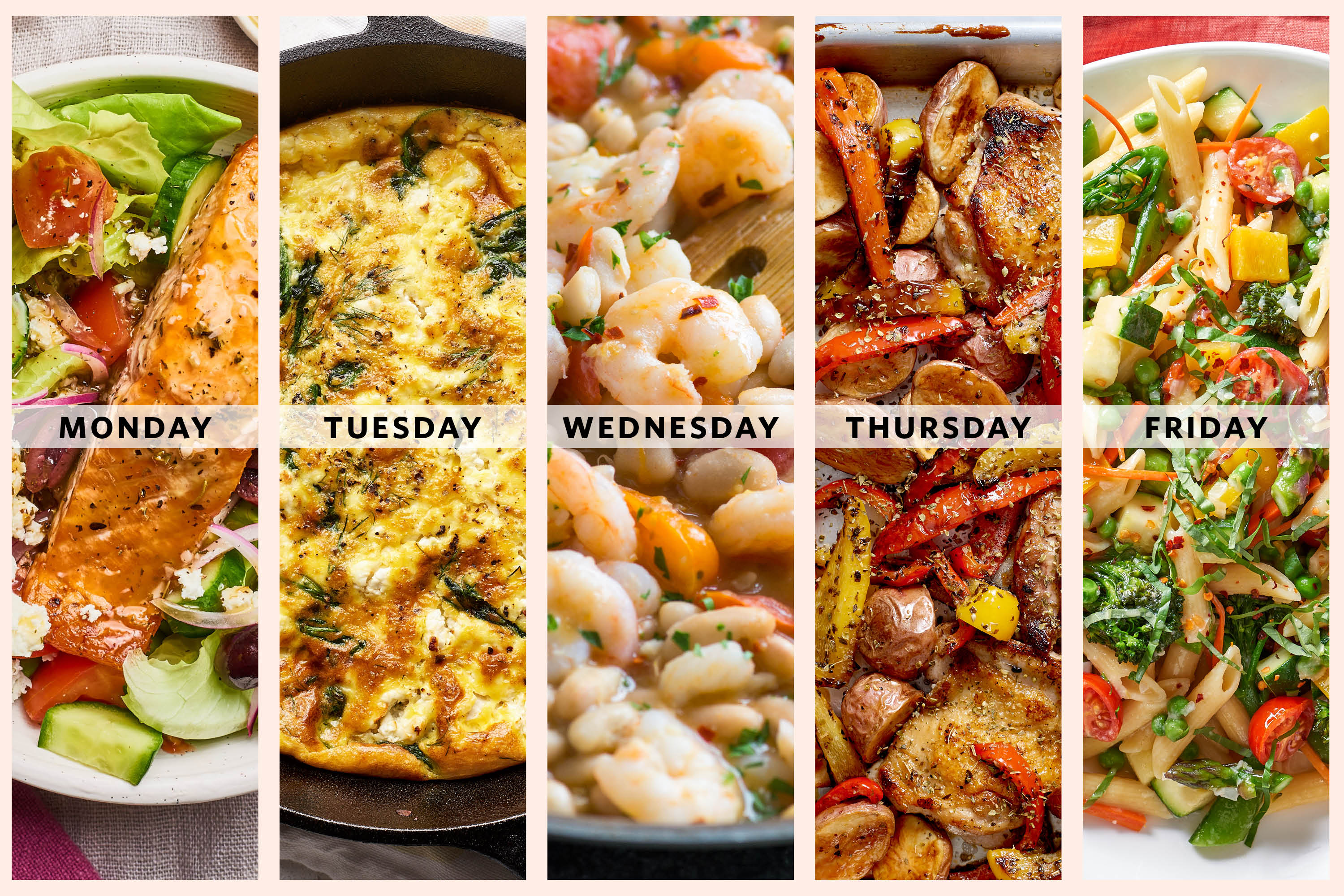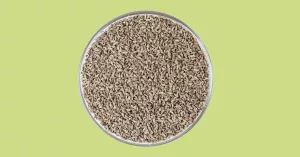Abundant in fruits, vegetables, whole grains, and heart-friendly fats, the Mediterranean eating pattern can support weight management, protect cardiovascular health, and help reduce the risk of diabetes.
This way of eating typically emphasizes whole, minimally processed foods — including lots of produce, whole grains, and lean proteins — while reducing reliance on processed items.
The Mediterranean diet doesn’t mandate strict calorie counting, but general recommendations can guide you in adopting its habits day-to-day.
Keep reading to explore the Mediterranean diet, simple steps to follow it, and the potential health effects. We also provide meal suggestions, snack ideas, and links to recipe resources.

Foods to include on a Mediterranean diet
Because the Mediterranean diet varies among nations and regions, it’s hard to list a single set of required foods.
Generally, though, the pattern:
- is rich in nutrient-dense plant foods
- limits the amount of animal products and red meat
- features fish and seafood at least a couple of times per week
You can use fresh, frozen, dried, or canned fruits and vegetables — just check labels for added sugars or excess sodium.
Common staples include:
- Vegetables: tomatoes, broccoli, kale, spinach, onions, cauliflower, carrots, Brussels sprouts, cucumbers, potatoes, sweet potatoes, turnips
- Fruits: apples, bananas, oranges, pears, strawberries, grapes, dates, figs, melons, peaches
- Nuts, seeds, and nut butters: almonds, walnuts, macadamias, hazelnuts, cashews, sunflower seeds, pumpkin seeds, almond butter, peanut butter
- Herbs, spices, condiments: sea salt, pepper, turmeric, cinnamon, cayenne, oregano, garlic, basil, mint, rosemary, sage, nutmeg
- Legumes: beans, peas, lentils, pulses, peanuts, chickpeas
- Whole grains: oats, brown rice, rye, barley, corn, buckwheat, whole wheat bread and pasta
- Fish and seafood: salmon, sardines, trout, tuna, mackerel, shrimp, oysters, clams, crab, mussels
- Poultry: chicken, duck, turkey
- Eggs: chicken, quail, duck eggs
- Dairy: cheeses, yogurt, milk
- Healthy fats: extra-virgin olive oil, olives, avocados, avocado oil
- Seafood (again): salmon, sardines, mackerel, trout, shrimp, mussels
- Dairy products (again): Greek yogurt, yogurt, milk
Begin by adding more of these items to your regular meal plan.
»Our PicksMediterranean Diet Meal Delivery Services We’ve TestedFoods to limit on a Mediterranean diet
Items to reduce or avoid include:
- Added sugars: prevalent in sodas, candy, ice cream, table sugar, syrups, and many baked goods
- Refined grains: white bread, white pasta, many tortillas, chips, and some crackers
- Trans fats: often present in margarine, deep-fried foods, and certain processed products
- Processed meats: sausages, hot dogs, deli slices, beef jerky
- Highly processed foods: fast-food items, convenience meals, microwave popcorn, many granola bars
Beverages
Drinks that fit well with the Mediterranean approach include:
- water
- coffee and tea with minimal added sugar or cream
- small to moderate amounts of red wine, ideally consumed with food
- 100% fruit juices without added sugars
Drinks to limit:
- beer and distilled spirits in excess
- sugar-sweetened beverages like sodas, which are high in added sugar
- fruit drinks with added sugar
Sample Mediterranean diet menu and recipes
Here’s a sample 7-day meal plan that reflects Mediterranean-style eating.
Adjust portion sizes and ingredient choices to suit your caloric needs and taste, and include snacks as you like.
For more inspiration, see this collection of 21 healthy Mediterranean recipes.

Monday
- Breakfast: Greek yogurt topped with strawberries and chia seeds
- Lunch: whole-grain sandwich spread with hummus and filled with vegetables
- Dinner: tuna salad over greens dressed with olive oil, plus a fresh fruit salad
Tuesday
- Breakfast: oatmeal mixed with blueberries
- Lunch: caprese-style zucchini noodles with mozzarella, cherry tomatoes, olive oil, and balsamic
- Dinner: mixed salad with tomatoes, olives, cucumbers, farro, baked trout, and feta
Wednesday
- Breakfast: omelet with mushrooms, tomatoes, and onions
- Lunch: whole-grain sandwich with cheese and fresh veggies
- Dinner: Mediterranean-style lasagna
Thursday
- Breakfast: yogurt with sliced fruit and a sprinkle of nuts
- Lunch: quinoa salad with chickpeas
- Dinner: broiled salmon with brown rice and steamed vegetables
Friday
- Breakfast: eggs with sautéed vegetables and whole wheat toast
- Lunch: stuffed zucchini boats with pesto, turkey sausage, tomatoes, peppers, and cheese
- Dinner: grilled lamb with a salad and a baked potato
Saturday
- Breakfast: oatmeal with nuts and raisins or apple slices
- Lunch: lentil salad with feta, tomatoes, cucumbers, and olives
- Dinner: Mediterranean-style pizza made on whole wheat pita and topped with cheese, veggies, and olives
Sunday
- Breakfast: omelet with mixed vegetables and olives
- Lunch: falafel bowl with feta, onions, tomatoes, hummus, and rice
- Dinner: grilled chicken served with vegetables, sweet potato wedges, and fresh fruit
Most people following this pattern don’t need to track calories or macronutrients unless they’re managing blood glucose.
However, it remains important to eat in moderation and be mindful of portion sizes.
Snack ideas for a Mediterranean diet
When you need something between meals, try these healthful snack choices:
- a small handful of nuts
- a piece of whole fruit
- baby carrots with hummus
- mixed berries
- grapes
- Greek yogurt
- a hard-boiled egg seasoned with salt and pepper
- apple slices with almond butter
- sliced bell peppers with guacamole
- cottage cheese with fresh fruit
- chia pudding
Frequently asked questions
Below are answers to common questions about the Mediterranean diet.
What are the top 10 foods on a Mediterranean diet?
Examples of recommended foods include chard, broccoli, grapes, parsley, olives and olive oil, lentils, buckwheat, sunflower seeds, avocado, and fish.
Moderate amounts of red wine can be enjoyed, typically in small servings with meals.
What foods should you avoid on a Mediterranean diet?
You should limit red meat, processed foods (including processed meats), and refined carbohydrates like added sugars.
Are eggs part of the Mediterranean diet?
Eggs can be consumed in moderation — for instance, around 2 to 4 servings per week is commonly suggested.
Is the Mediterranean diet anti-inflammatory?
A 2018 study found that poor adherence to the Mediterranean pattern was linked with higher inflammatory markers in the blood, likely because many foods in this diet have anti-inflammatory properties.
However, additional research is still needed to fully understand its effects on different kinds of inflammation and disease outcomes.
The bottom line
There isn’t a single fixed Mediterranean diet; rather, general recommendations encourage a focus on plant-based foods, moderate dairy and fish intake, and minimal consumption of highly processed items like candy and processed meats.
The Mediterranean eating style has been associated with several potential health benefits, such as helping to control weight, improving blood sugar stability, supporting heart health, and possibly benefiting cognitive function.
Part of its appeal lies in providing nutrient balance while being flexible and sustainable for many people.

























Leave a Reply
You must be logged in to post a comment.